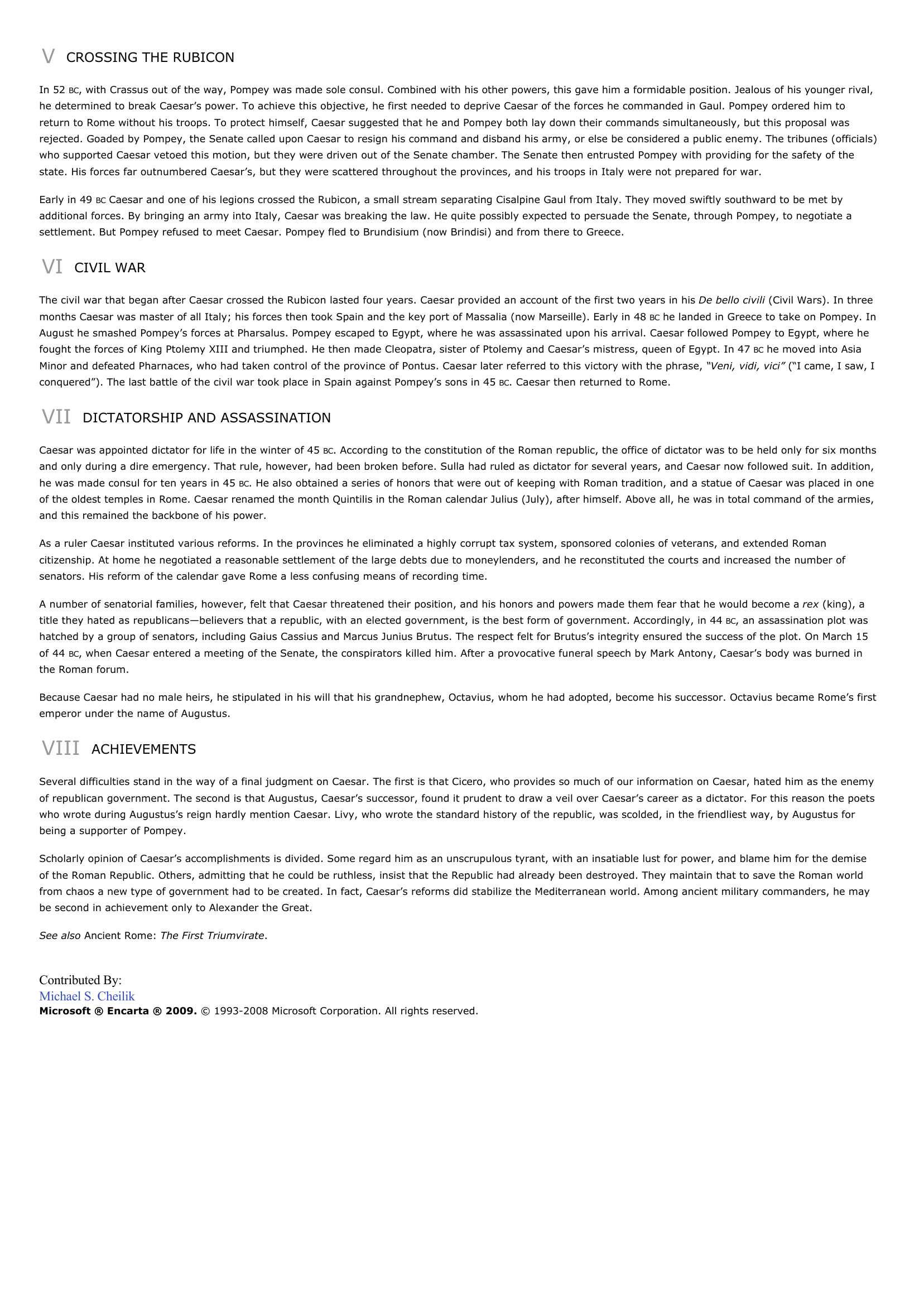Julius Caesar.
Publié le 03/05/2013
Extrait du document
«
V CROSSING THE RUBICON
In 52 BC, with Crassus out of the way, Pompey was made sole consul.
Combined with his other powers, this gave him a formidable position.
Jealous of his younger rival, he determined to break Caesar’s power.
To achieve this objective, he first needed to deprive Caesar of the forces he commanded in Gaul.
Pompey ordered him toreturn to Rome without his troops.
To protect himself, Caesar suggested that he and Pompey both lay down their commands simultaneously, but this proposal wasrejected.
Goaded by Pompey, the Senate called upon Caesar to resign his command and disband his army, or else be considered a public enemy.
The tribunes (officials)who supported Caesar vetoed this motion, but they were driven out of the Senate chamber.
The Senate then entrusted Pompey with providing for the safety of thestate.
His forces far outnumbered Caesar’s, but they were scattered throughout the provinces, and his troops in Italy were not prepared for war.
Early in 49 BC Caesar and one of his legions crossed the Rubicon, a small stream separating Cisalpine Gaul from Italy.
They moved swiftly southward to be met by additional forces.
By bringing an army into Italy, Caesar was breaking the law.
He quite possibly expected to persuade the Senate, through Pompey, to negotiate asettlement.
But Pompey refused to meet Caesar.
Pompey fled to Brundisium (now Brindisi) and from there to Greece.
VI CIVIL WAR
The civil war that began after Caesar crossed the Rubicon lasted four years.
Caesar provided an account of the first two years in his De bello civili (Civil Wars).
In three months Caesar was master of all Italy; his forces then took Spain and the key port of Massalia (now Marseille).
Early in 48 BC he landed in Greece to take on Pompey.
In August he smashed Pompey’s forces at Pharsalus.
Pompey escaped to Egypt, where he was assassinated upon his arrival.
Caesar followed Pompey to Egypt, where hefought the forces of King Ptolemy XIII and triumphed.
He then made Cleopatra, sister of Ptolemy and Caesar’s mistress, queen of Egypt.
In 47 BC he moved into Asia Minor and defeated Pharnaces, who had taken control of the province of Pontus.
Caesar later referred to this victory with the phrase, “Veni, vidi, vici” (“I came, I saw, I conquered”).
The last battle of the civil war took place in Spain against Pompey’s sons in 45 BC.
Caesar then returned to Rome.
VII DICTATORSHIP AND ASSASSINATION
Caesar was appointed dictator for life in the winter of 45 BC.
According to the constitution of the Roman republic, the office of dictator was to be held only for six months and only during a dire emergency.
That rule, however, had been broken before.
Sulla had ruled as dictator for several years, and Caesar now followed suit.
In addition,he was made consul for ten years in 45 BC.
He also obtained a series of honors that were out of keeping with Roman tradition, and a statue of Caesar was placed in one of the oldest temples in Rome.
Caesar renamed the month Quintilis in the Roman calendar Julius (July), after himself.
Above all, he was in total command of the armies,and this remained the backbone of his power.
As a ruler Caesar instituted various reforms.
In the provinces he eliminated a highly corrupt tax system, sponsored colonies of veterans, and extended Romancitizenship.
At home he negotiated a reasonable settlement of the large debts due to moneylenders, and he reconstituted the courts and increased the number ofsenators.
His reform of the calendar gave Rome a less confusing means of recording time.
A number of senatorial families, however, felt that Caesar threatened their position, and his honors and powers made them fear that he would become a rex (king), a title they hated as republicans—believers that a republic, with an elected government, is the best form of government.
Accordingly, in 44 BC, an assassination plot was hatched by a group of senators, including Gaius Cassius and Marcus Junius Brutus.
The respect felt for Brutus’s integrity ensured the success of the plot.
On March 15of 44 BC, when Caesar entered a meeting of the Senate, the conspirators killed him.
After a provocative funeral speech by Mark Antony, Caesar’s body was burned in the Roman forum.
Because Caesar had no male heirs, he stipulated in his will that his grandnephew, Octavius, whom he had adopted, become his successor.
Octavius became Rome’s firstemperor under the name of Augustus.
VIII ACHIEVEMENTS
Several difficulties stand in the way of a final judgment on Caesar.
The first is that Cicero, who provides so much of our information on Caesar, hated him as the enemyof republican government.
The second is that Augustus, Caesar’s successor, found it prudent to draw a veil over Caesar’s career as a dictator.
For this reason the poetswho wrote during Augustus’s reign hardly mention Caesar.
Livy, who wrote the standard history of the republic, was scolded, in the friendliest way, by Augustus forbeing a supporter of Pompey.
Scholarly opinion of Caesar’s accomplishments is divided.
Some regard him as an unscrupulous tyrant, with an insatiable lust for power, and blame him for the demiseof the Roman Republic.
Others, admitting that he could be ruthless, insist that the Republic had already been destroyed.
They maintain that to save the Roman worldfrom chaos a new type of government had to be created.
In fact, Caesar’s reforms did stabilize the Mediterranean world.
Among ancient military commanders, he maybe second in achievement only to Alexander the Great.
See also Ancient Rome: The First Triumvirate .
Contributed By:Michael S.
CheilikMicrosoft ® Encarta ® 2009. © 1993-2008 Microsoft Corporation.
All rights reserved..
»
↓↓↓ APERÇU DU DOCUMENT ↓↓↓
Liens utiles
- Le personnage de CESAR [Julius Caesar]
- Gaius Julius Caesar - Geschichte.
- Portia and Brutus in Shakespeare's Julius Caesar, Scene
- Germanicus Julius Caesar , 15 avant J.
- César Jules, en latin Caius Julius Caesar.

































